Lessons From the Front Lines
This Doctors' Day, physicians from across NewYork-Presbyterian reflect on their roles during the COVID-19 pandemic and the most important lesson they learned: “There will always be hope”
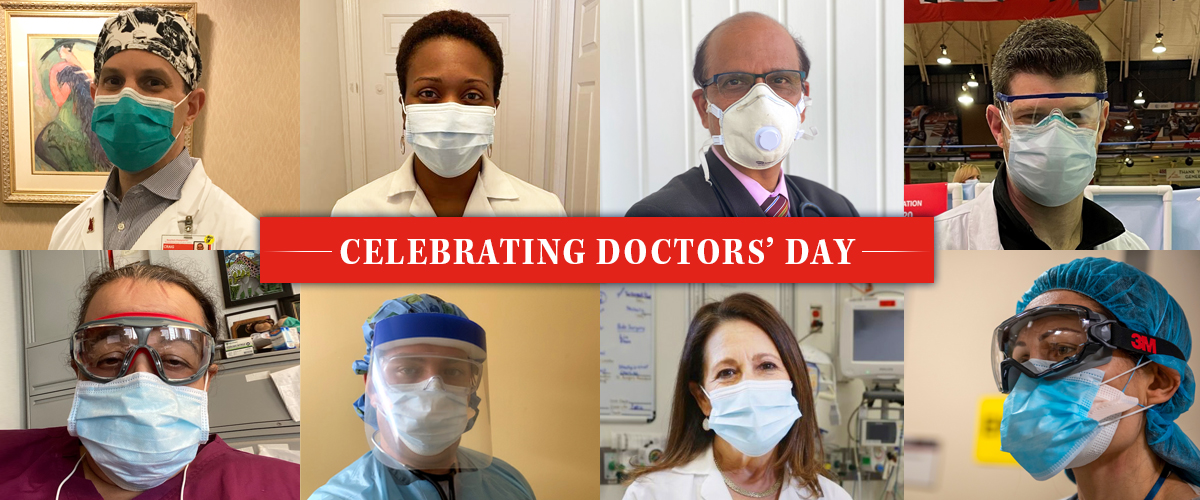

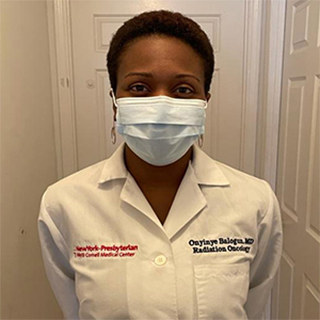
Dr. Onyinye Balogun
She cared for her cancer patients and volunteered in the Emergency Department at the height of the pandemic
When COVID hit our front step, my husband, who is also an oncologist, was assigned to staff the ICU at another hospital. I was just praying because his birthday is in May, and I said, I just want him to see another birthday. I was at both NewYork-Presbyterian/Weill Cornell Medical Center and NewYork-Presbyterian Brooklyn Methodist Hospital because I had cancer patients at both campuses who needed procedures. It was a lot of coordination, and we advocated for the patients who needed access to the OR so that we could cure their cancer.
During the day, I was maintaining the office, trying to keep the patients safe, advocating for people to get the lifesaving procedures that they needed, and then at night, I’d go home and help with telehealth visits to the Emergency Department. As I’m listening to the sirens going around my neighborhood, I’m talking to patients, and it was just case after case after case of trying to advise and assist people experiencing COVID symptoms.
Before COVID-19, at least two or three times a year, I would travel and work with international cancer centers to ensure that their radiation therapy techniques were up to date and that they were delivering radiotherapy safely. But this pandemic made me look closer at home, in my own backyard. We’ve heard a lot about the inequities that COVID-19 magnified, and it was a weight on my chest. I decided to come to Brooklyn to help with the opening of the cancer center at the Center for Community Health. I said, “Let me move to Brooklyn and see what I can do.”
That’s my biggest takeaway: Yes, there’s COVID-19, but we can’t just stop still in the face of COVID-19. There’s still cancer, and we oncologists are dedicated to making sure that we will keep you safe from COVID-19 so you can still get your care. And we will do our best to treat you or cure you — COVID-19 is not going to stop us.
— Dr. Onyinye Balogun, radiation oncologist, NewYork-Presbyterian Brooklyn Methodist Hospital
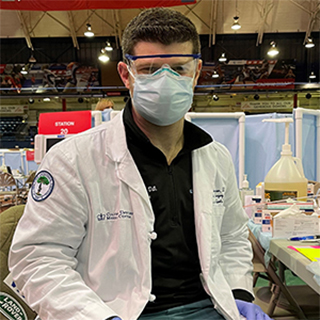
Dr. Elan Goldwaser
He helped restart sports in the New York region and vaccinated patients at his old stomping grounds, the Armory
At the end of February 2020, right before the world shut down, I was covering an Alpine World Cup event in Japan as a team doctor for USA Skiing. While there, the athletes and coaching staff were starting to become nervous about the virus and didn’t know how to protect themselves. As I explained basic sanitation skills, other doctors from Italy and Germany overheard me and asked if I could come teach their athletes as well. I realized how much the rest of the world looked to Americans not only as role models, but also for up-to-date information regarding best practices on how to approach the pandemic.
Back at home, I’m also a team physician for Fordham University, as well as covering multiple colleges and schools in the New York City area. I helped write and implement COVID-19 protocols across these schools to maximize safety and allow sports to happen successfully this year. I like to think that I’ve been on the front lines for New York City, but in a different way – responsibly restarting athletics for the region. Exercise is a vital component to keeping a well-balanced, healthy mind and body during these difficult times.
Sports have always been an important part of my life, and the Armory holds a special place in my heart. As a track and cross-country athlete in college, I ran many races at the Armory. When I later joined the Orthopedics Department at NewYork-Presbyterian/Columbia University Irving Medical Center as a sports medicine physician, I jumped at the chance to cover events at the Armory and serve as the medical director for their world-famous Millrose Games.
When the opportunity arose to volunteer for the vaccination efforts at the Armory, I was eager to reenter the facility under these unique circumstances and help take care of our community. I was honored and humbled to be given the opportunity to administer vaccines. I felt a sense of surrealism standing on the infield, which had been converted into a mass-vaccination site. I saw my past self running laps on the track, providing medical care to injured Olympic athletes, and now helping society overcome this global tragedy. Despite my prior experiences at the Armory, there was nothing more powerful than feeling connected to the community in this way. The atmosphere was hopeful for the first time in a year. Many patients were crying at the anticipation of safety and being able to see loved ones again. There was a lot of catharsis, and for me, new memories made.
— Dr. Elan Goldwaser, sports medicine physician, NewYork-Presbyterian/Columbia University Irving Medical Center and NewYork-Presbyterian Lawrence Hospital
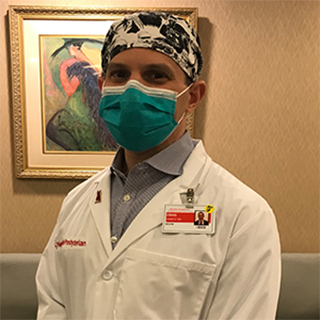
Dr. Craig Hametz
He redeployed his entire staff to work on the front lines in the hospital and saw a new level of coordination and commitment
When the pandemic hit last March, our medical offices essentially ceased to function as far as seeing patients. Even though we were open to people coming in, very few patients were coming in. Therefore, we used a lot of resources from the offices to help the hospital. With the surge in patients, it quickly became like a war zone. And everybody felt it. But the most miraculous thing that we saw was how people stepped up. From the physicians, to the nurses, to the patient care technicians (PCTs), and everyone else working on those floors, the willingness to put themselves in harm’s way was incredible.
Along with my colleagues, I worked to identify how to supplement the hospitalist team with our outpatient providers. We put a call out for people who were comfortable on the floors, and within one day we had at least 26 providers saying, “I’m happy to leave what I do in the office, walk through the floors, and take a full service load.”
I’ve been at NewYork-Presbyterian Hudson Valley Hospital since 2008. I’ve never seen anything matching the level of coordination we achieved, working together as a team. As disheartening as it was to see the tragedy that was unfolding around us, I’ve never been so proud of watching our team in action.
We know we’re not out of the woods, but as the numbers improve and vaccines get out there, we feel like we’re finally back to the point where we can do what we’ve signed up to do in this profession. That includes making people better and helping get the world back to normal life. I am proud to be part of an organization that can work together. And I truly hope our memories aren’t short-lived. As we eventually return to normal, I hope we can renew our focus on improving the lives of our patients and build on those relationships we created and the understanding of what we can do when we all work together.
— Dr. Craig Hametz, Chief, Department of Medicine, NewYork-Presbyterian Hudson Valley Hospital and Medical Director, NewYork-Presbyterian Medical Group Hudson Valley
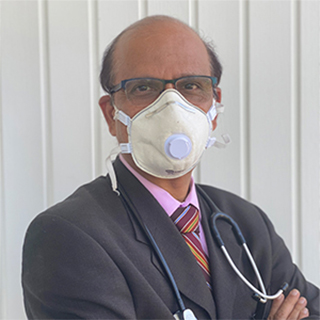
Dr. Parag Mehta
He lost loved ones and became sick with COVID-19, but he kept fighting, inspired by the love that surrounded him
Our lives have radically changed since the COVID-19 pandemic began. We have learned, lost, survived, and grown. We have persevered against challenges, and during the worst times, we have discovered the best qualities among our peers.
During the weeks that I was sick, I reflected on my life. I remembered colleagues and patients who valiantly fought against COVID-19. I lost my mother-in-law and couldn’t be at her side to ease her suffering. My heart ached for the families who also could not be there for their loved ones. These adversities transformed me into a more resilient person with a greater appreciation for all the joy I have in my life. Ultimately, as I felt better, I returned to work. Even with reduced stamina and endurance, I still felt much healthier mentally and spiritually. After seeing so much untimely death, my biggest takeaway was that life is short and fragile. It is time to appreciate what you have. Start giving back now. If you love someone, say it now.
Since my return to the hospital, I’ve focused on assessing the patients’, institution’s, and physicians’ needs and on supporting them as they navigate a world changed by COVID-19. During this demanding time, the well-being of healthcare heroes is my main concern. There is one certainty during these times of uncertainty: there is love, support, and positivity all around us. There is an abundance of humanity and goodwill, exhibited through the countless acts of selflessness I have observed in my community.
At various points in our lives, we may be shrouded by fog, a fog that can make it unclear what lies ahead. These acts of kindness will help to clear that fog. And once the fog clears, I hope that you begin to cherish even more the rays of sunshine caressing your face, the fresh scent of the air around you, and the love that fills your life.
— Dr. Parag Mehta, Senior Vice Chairman, Department of Medicine, NewYork-Presbyterian Brooklyn Methodist Hospital
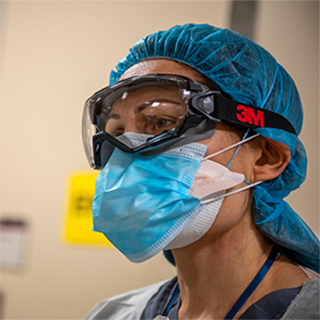
Dr. Angela Mills
Managing four emergency departments throughout the pandemic, she got through the most challenging times with the support of her colleagues
In emergency medicine, we have this mantra of “Anyone, anything, anytime.” That’s why I chose emergency medicine — being able to care for people when they need us the most. As part of our training, we learn how to provide care for disasters and mass casualty incidents, but this pandemic has been very different.
As the chair, I oversee the emergency departments at NewYork-Presbyterian/Columbia University Irving Medical Center, NewYork-Presbyterian Allen Hospital, NewYork-Presbyterian Morgan Stanley Children’s Hospital, and NewYork-Presbyterian Lawrence Hospital. If I had to use one word to define the period in the spring when the pandemic first started, the word would be uncertainty. We were seeing a very large percentage of patients who were quite ill with the challenges of not yet fully understanding the disease and how it was going to progress, protocols and guidelines changing daily, and the fear of getting sick ourselves and infecting loved ones.
As a leader, you try your hardest to make sure that everybody is taken care of — that responsibility is heavy — and it’s easy to forget about yourself. It was very difficult, especially in March, because I was sick with COVID-19, and there were still incredibly long days with Zoom meetings scheduled late into the evening. I wasn’t sleeping enough or taking care of myself in the way I needed. But I was fortunate to have lots of people around me who were checking in with me. This made me realize how important it is to have a support system, and I am grateful for mine. We have to keep ourselves healthy and safe so that we can better care for our patients, our staff, and one another.
I will always remember the humanity and acts of kindness I witnessed this past year — the compassion of staff sitting in their full PPE using FaceTime to connect patients with their families because we couldn’t have visitors in the ED; the collegiality of redeployed staff working to assist us in the emergency department; and the humanity of colleagues reaching out and asking what they could do for one another. That has been a significant silver lining of this whole pandemic — seeing all the compassion and humanity that surrounds all of us.
— Dr. Angela Mills, Chair, Department of Emergency Medicine and Chief of Emergency Medicine Services at NewYork-Presbyterian/Columbia University Irving Medical Center
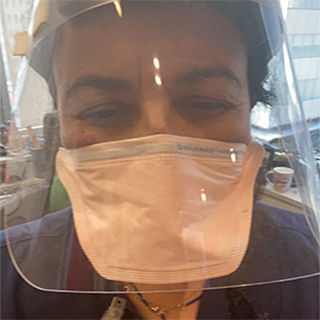
Dr. Susana Morales
She cared for patients on the front lines and continues to work in the community to educate and address vaccine hesitancy
My parents were involved in the community health movement of the 1970s — my father as a community organizer and then health administrator and my mom as a nurse practitioner. They inspired me to consider medicine, and my early career included a set of epidemics — crack cocaine, AIDS, and tuberculosis — when I was a student and resident. I decided to do primary care medicine and medical education and have been an advocate for workforce diversity and health equity. This year has magnified racial and ethnic health disparities and their brutal toll. I believe we must recommit to addressing racial and social justice and heal our country.
During March of 2020, we started to see patients with COVID-19 in our outpatient practice, in our fever clinic. I worked on the inpatient wards in April. It was unbelievable. Many physicians redeployed to work with adult COVID-19 patients, including pediatricians and rehab medicine doctors. I will never forget the look of terror on a patient’s face as I held up an iPad so the patient could talk to weeping family members. The patient was intubated hours later. The experiences are burned into our minds.
Through it all, I remain inspired — by the devotion of my friends and colleagues; by the self-sacrifice of the healthcare workers, many of whom have been sickened by COVID-19; by the courage of the patients; by the amazing work of our staff in the Diversity Center of Excellence and in my department; and by faculty, residents, students, staff, and community advocates serving on our Racial Justice Task Force. Over the last few months, a group of us have worked to educate and empower patients and communities with information about COVID-19 vaccines. Collectively, we have spoken to thousands of people. During these sessions, many people have told us that they were hesitant about vaccination, but when they got more information and their questions were answered, they were going to sign up. We were so happy that we could help. It is very gratifying to be able to share our own journeys with members of our community.
— Dr. Susana Morales, primary care physician, NewYork-Presbyterian/Weill Cornell Medical Center
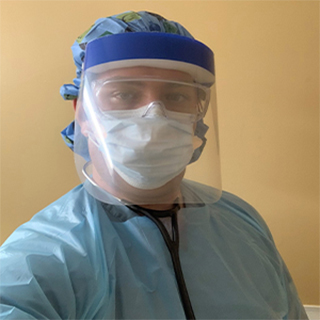
Dr. Demetrios Paidoussis
From the epicenter of the pandemic, he provided care for hundreds of COVID-19-positive patients via telehealth, allowing them to recover at home
In March 2020, with the hospital filling up to capacity, it became apparent that there was a need for telehealth and remote care for patients with COVID-19 who didn’t require hospitalization. Along with a group of other primary care physicians, nurses, and administrators from the NYP Medical Group Queens, I supported the rapid development of a telemedicine program for patients with COVID-19. The medical group team created a phone number for patients within our community to call to connect them with physicians and provide them with medical care at home. This number spread rapidly to different communities of New York by word of mouth as we became a critical source for medical care.
As part of remote treatment, patients received continuous nurse monitoring and physician management until they were stabilized. Our team coordinated services with local vendors and pharmacies to help those patients most in need of medication and oxygen support. From March 1 through July 5, our team had nearly 19,000 encounters via telehealth.
Clinically, the most meaningful experiences that I have had this past year were when I heard the daily improvement in the breathing of patients whom many times I could not see, only hear through the telephone. One patient in particular stays in my mind. This patient required inpatient care, but declined hospitalization due to fear. However, with daily assessments, in conjunction with our team of nurses, the patient was able to recover safely at home.
After one year of living through the worst health crisis of our generation, in what turned out to be the epicenter of the coronavirus pandemic, Queens, New York, I have taken away some of the most important lessons of my life. Despite fear, terrible loss of life, and constant unknowns, there will always be hope, resilience, and the strength of community. Nothing could have prepared me, my colleagues, and my family for what we have experienced this past year, but with strong teamwork, dedication, and great sacrifice from all, we were able to provide the highest quality care for our community.
— Dr. Demetrios Paidoussis, primary care physician, NewYork-Presbyterian Medical Group Queens
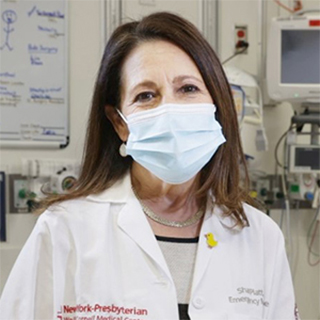
Dr. Shari Platt
She found ways to connect with her pediatric patients and continues to work to protect their mental health
I started at NewYork-Presbyterian on September 1, 2001, 10 days before 9/11. On that day, there was an eerie silence in the ER, but tons of people came ready to help. I felt that same sense of camaraderie during the COVID-19 pandemic.
One of the first things we did to accommodate the surge in adult patients was to close the pediatric emergency area and convert it to an adult COVID-19 unit. Pediatric emergency patients were seen in one room, and since child visits had dropped dramatically, our pediatric emergency providers rapidly adjusted to treating young adults. Many of our patients were sick and scared to be in the hospital. More than ever, I recognized how important it was to form a connection with patients and ensure that they trusted us. Since we wore so much PPE, my colleague and I started a project in which staff would wear large buttons with our faces on them, so our patients could see what we looked like. Patients loved the buttons.
I continue to think about the mental health impact of the pandemic, especially among children. Fewer children got very sick with COVID-19 compared to adults, but they have not been spared. We don’t know what’s going to happen with our future generations and the long-term impact of the pandemic on their mental health. I love taking care of children because they’re resilient and happy, and you can easily make a bond with them. But this year, there have been so many lost connections. This hasn’t been normal, and children are struggling. It’s something that we are talking about a lot and working to get better resources for. I remain hopeful we’ll see that resiliency as our city and schools reopen.
— Dr. Shari Platt, Chief of Pediatric Emergency Medicine, NewYork-Presbyterian Komansky Children’s Hospital and Weill Cornell Medicine

